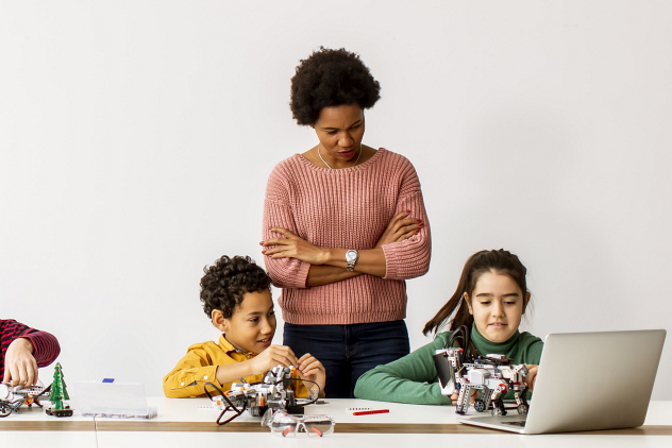The Role of Teachers in Child Development
“Steppingstone is dedicated to providing a learning environment for the unique needs of gifted children – academically, intellectually, socially, physically, and emotionally”
Building a Strong Foundation for Future Success of Gifted Children
The education of a gifted child is a task that requires a specialized approach and constant attention. Teachers play a fundamental role in this process, as they are responsible for identifying and nurturing the exceptional abilities of these children, known for their unique characteristics. This article explores the importance of teachers in the development of gifted children, analyzes effective teaching methods, and highlights how parents can collaborate with teachers to support their child’s development.
The Importance of Teachers in the Development of Gifted Children
Teachers are essential pillars in the life of a gifted child. These children, who show signs of exceptional abilities from an early age, require expert guidance to reach their full potential. The characteristics of a gifted child include high intellectual capacity, unusual creativity, and advanced skills in specific areas. However, without proper guidance, these abilities may go unnoticed or not be developed correctly.
A trained teacher can identify the characteristics of a gifted child and tailor their educational approach to meet the specific needs of these students. This not only involves providing more advanced learning materials but also fostering an environment where the child feels understood and valued.


Effective Teaching Methods in the Early Education of Gifted Children
Educating gifted children requires specific teaching methods that can maintain their interest and challenge their abilities. These methods include:
- Curriculum Enrichment: Providing additional and more advanced content than the standard to stimulate their intellect.
- Differentiated Learning: Adapting lessons to the individual abilities and needs of each gifted child.
- Mentoring and Tutoring: Facilitating interaction with mentors and tutors who can guide children in specific areas of interest.
- Independent Projects: Allowing children to work on independent projects that interest and challenge them.
How Parents Can Collaborate with Teachers
Collaboration between parents and teachers is crucial for the success of gifted children. Parents can support their child’s development by:
- Open Communication: Maintaining constant communication with teachers to stay informed about the child’s progress and needs.
- Support at Home: Providing a home environment that complements school education, with additional resources and encouragement for learning.
- Active Participation: Getting involved in school activities and events to better understand their child’s educational experiences.
- Resources and Opportunities: Seeking resources and opportunities outside of school that can enrich the child’s learning and development.
In conclusion, teachers play an indispensable role in the development of gifted children. Their ability to identify and nurture the exceptional abilities of these children can have a lasting impact on their lives. With effective teaching methods and close collaboration with parents, teachers can help build a strong foundation for the future success of gifted children.
